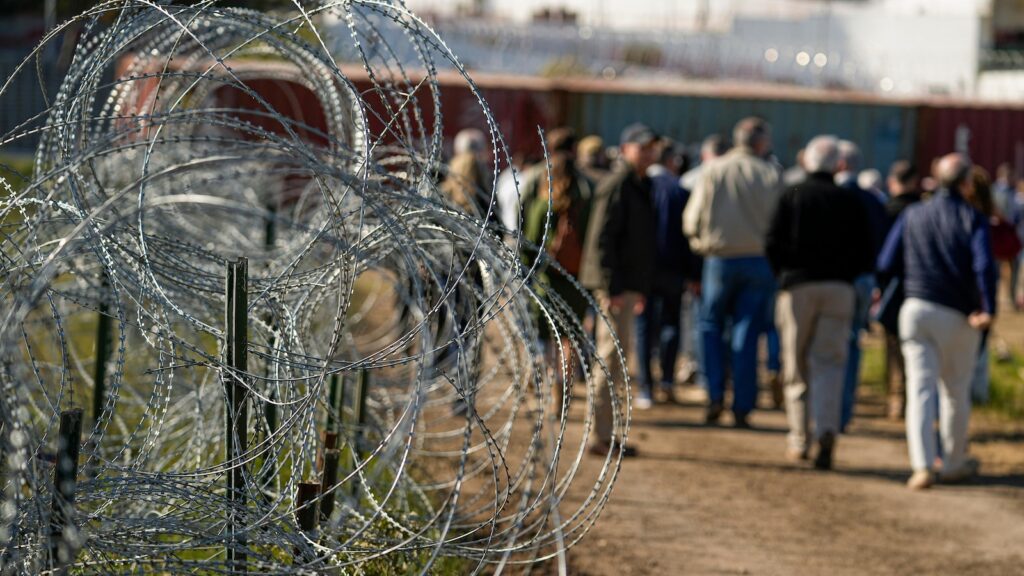Title: “The Rivers of Liberty: The Escalating Clash Over Texas Border Park”
There is a brewing storm in the Lone Star State as the Biden Administration reprises its demand for Texas to yield access to Border Patrol agents across a riverfront park that has become a favored crossing point for illegal migrants into the United States. The conflict has triggered an already contentious dispute between Texas state officials and the federal government. This is not merely a tussle over a patch of land; it represents a critical flashpoint in the broader debate over immigration enforcement, border control, and state autonomy.
The riverfront park in question, Shelby Park, skirts the edges of the Rio Grande, and has recently become a formidable battleground in the state’s attempts at curbing illegal border crossings. Rows of razor wire now span the park’s length, a highly visible deterrent sanctioned by Republican Gov. Greg Abbott – a response to the perceived apathy by the Biden administration towards illegal crossings.
Joe Biden is giving Texas 24 hours to comply with a US Supreme Court ruling and hand over border patrol posts to the federal government or face consequences for failing to do so.
— Jack Straw (@JackStr42679640) January 26, 2024
LibertyDaily pic.twitter.com/kaxNPncTWj
Earlier this month, Texas exercised a decisive power play: seizing control of the park and effectively barring Border Patrol agents from entering. The Department of Homeland Security, understanding the strategic importance of access to Shelby Park, responded on Tuesday with a letter asserting their claim for access, revealing a pointed rift between the Abbott Administration and President Biden’s federal authorities.
Biden has given Texas 24 hours to allow Border Patrol access to Shelby Park to remove razor wire barriers or face consequences. Gov. Abbot says Texas will continue to work to prevent criminals from entering the State. What's gonna happen? Report here https://t.co/LhZhM8OCRN pic.twitter.com/UU8LiXAwbY
— m o d e r n i t y (@ModernityNews) January 26, 2024
Gov. Abbott, currently traveling in India, challenged the Biden administration via social media: “Texas has a constitutional right to self-defense”. He did not, however, explicitly reference the boiling controversy over access to Shelby Park.
The impassioned response from both sides lays bare the intensity of the conflict surrounding border control. The monumentality of this struggle has not escaped the attention of Texas residents. Eagle Pass Mayor Rolando Salinas lamented the closure of the park on social media, indicating a lack of communication from state authorities about the reasons and duration of the closure.
Despite Texas’ claim of reopening the park just days after closure, skepticism from federal officials echoes unswayed due to the ongoing restriction of access to Border Patrol agents. The federal government’s demand for access extends not just to Shelby Park, but also to areas beneath a port of entry and a boat ramp.
🔴 The Biden administration has given the governor of the state of Texas 24 hours to implement the Supreme Court's ruling and transfer control of border posts in Texas to federal border guards. pic.twitter.com/sgvLExSE8y
— WORLD MILITARY (@Sabanado1) January 26, 2024
What perhaps appears as a seemingly remote local dispute could have profound national implications. The tug-of-war over a Texas riverfront park raises questions about immigration policies, the rights of states, individual liberties, and the role of federal government. The outcome of this battle, with each side obstinately defending its position, could set a precedent for the vexing national debate on border control.
As Friday’s deadline looms for Texas to respond to the Department of Homeland Security’s demand, it is impossible to ignore the broader implications of this issue. The fight for Shelby Park showcases the lengths to which states are willing to go to safeguard their boundaries, and reflect the depth of underlying national anxieties around immigration enforcement.
Biden gives Texas 24 HOURS to relinquish control of SHELBY PARK, THE BOAT LAUNCH, and the INTERNATIONAL BRIDGE!
— 𝕏 ƤΔʊ𝐋 ЯΞVΞЯΞ 𝕏𓂀 (@Paul_RevereJr) January 25, 2024
Gov Abbott says,"No way!".
There's no LAW against REPLACING the RAZOR WIRE they CUT.
So, he says he'll just KEEP LAYING IT DOWN!
TEXAS, WE ARE WITH YOU! pic.twitter.com/ZNjjEgSBkY
From the perspectives of liberty and state rights, the recent events unfolding at the border of Texas and Mexico emphasize the state’s endeavor to protect its borders, claiming their “constitutional right to self-defense.” Concurrently, they highlight the federal government’s earnest engagement in maintaining its jurisdiction over immigration affairs. This stand-off between state and nation brings to the fore more than just a park dispute; it spotlights the chasm between notions of liberty, security, and legality in fiercely contested immigration debates.
As the conflict intensifies, Texans and the rest of the nation watch on, waiting to see how this drama will culminate. The outcome will undeniably reverberate throughout the country, shaping the narrative of immigration enforcement, border control, and the autonomy of states. Regardless of the resolution, the struggle for Shelby Park underscores the continuous battle for liberty amidst the ongoing national reckoning over immigration policy.



